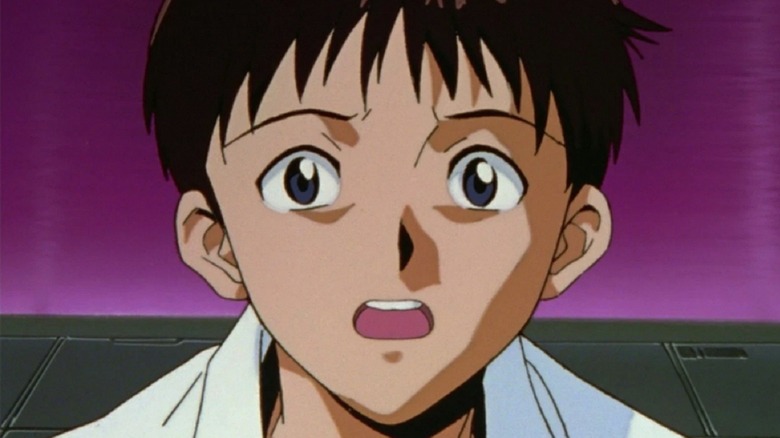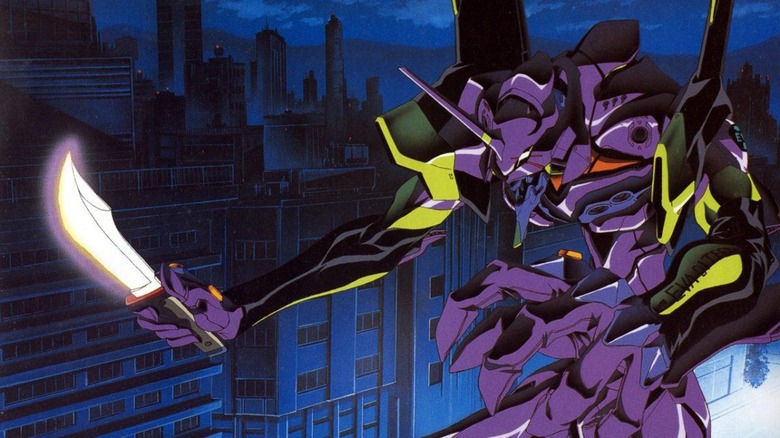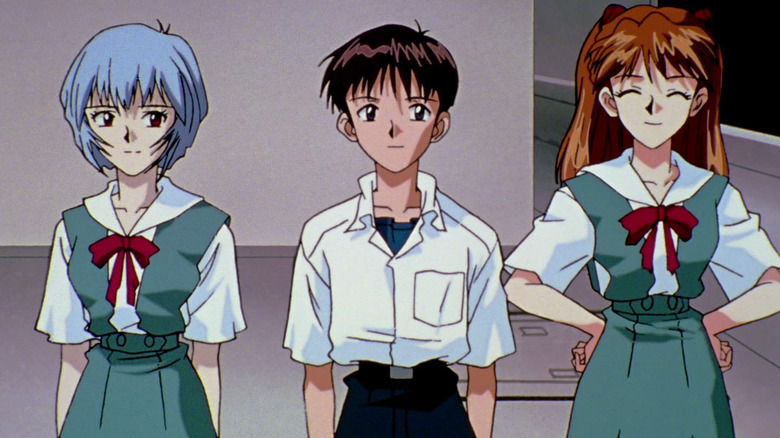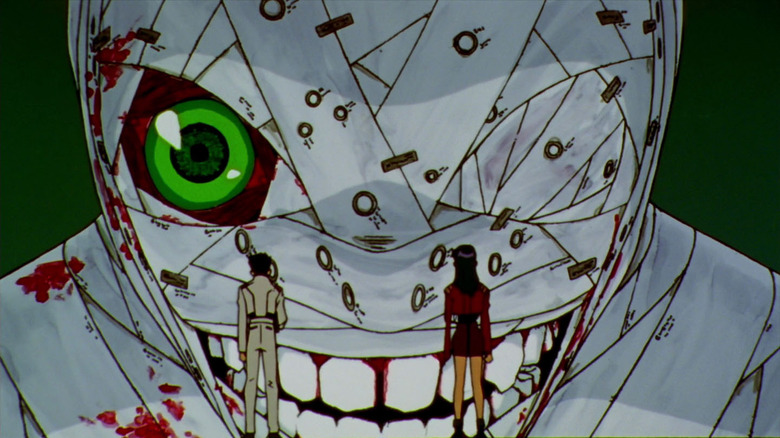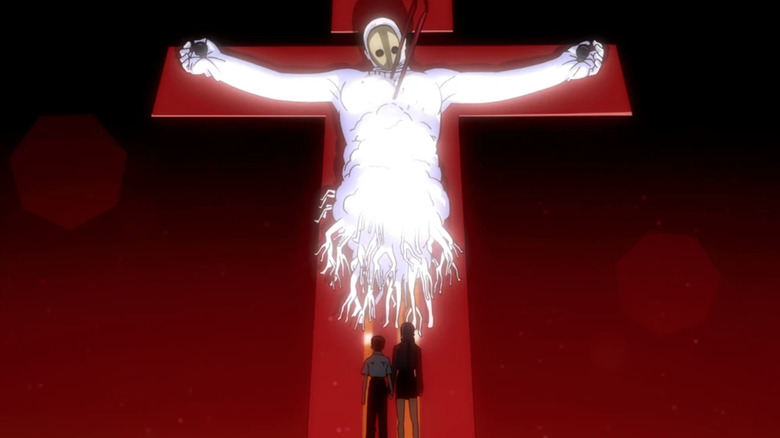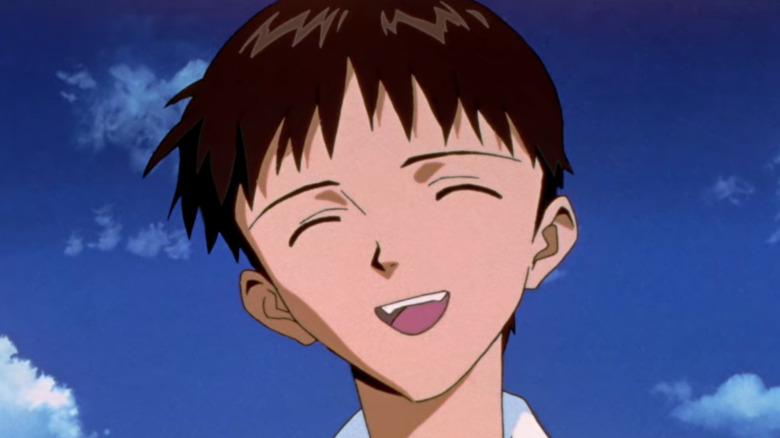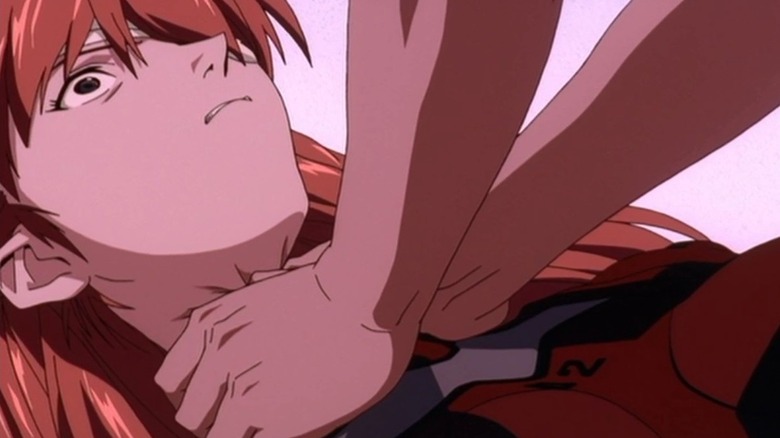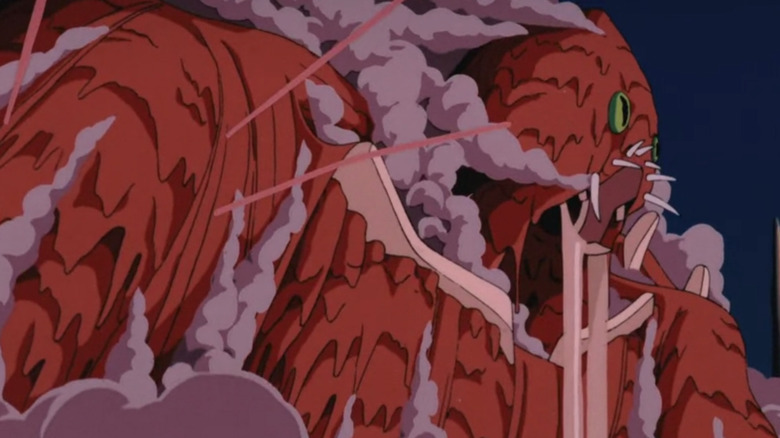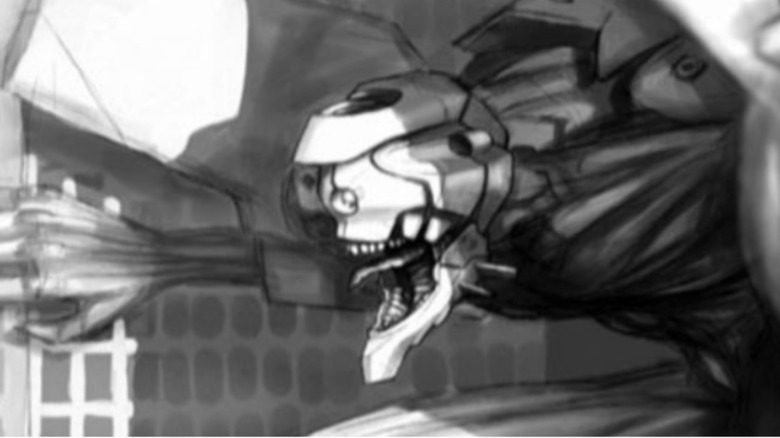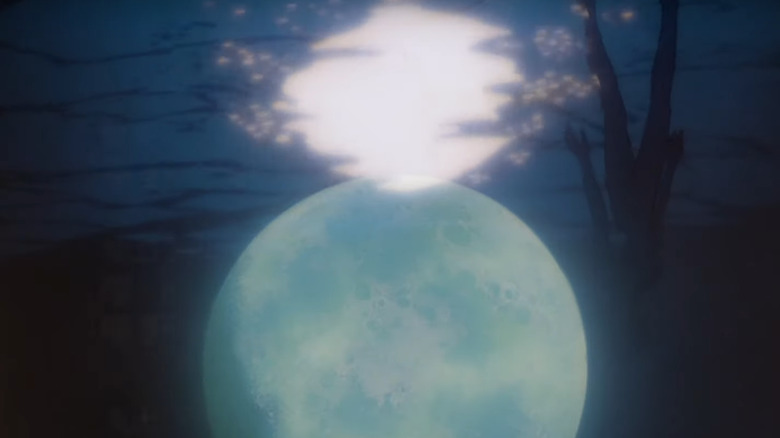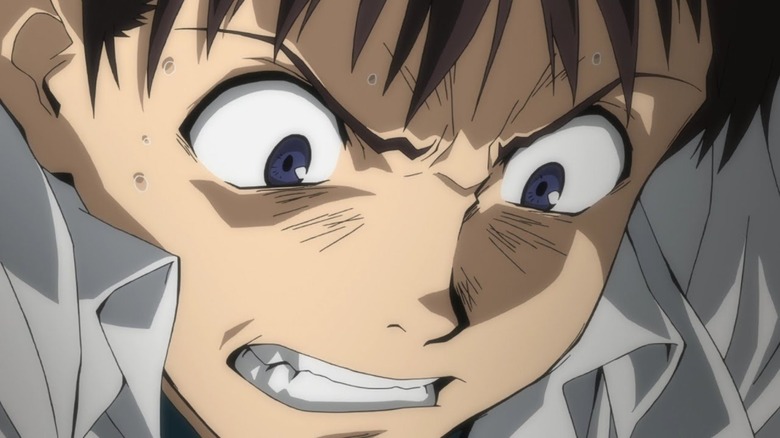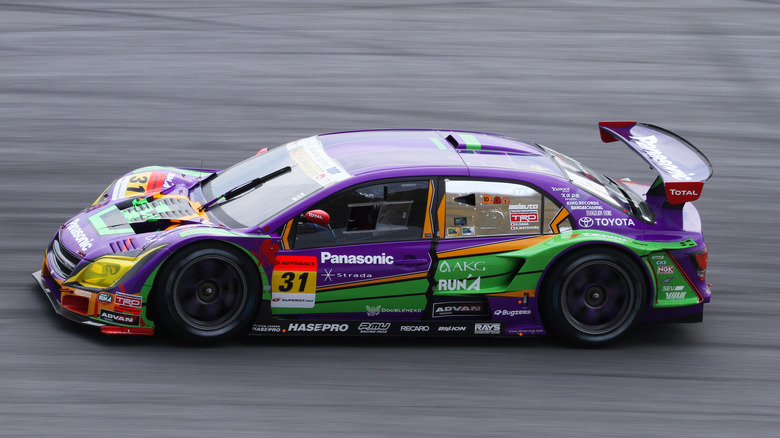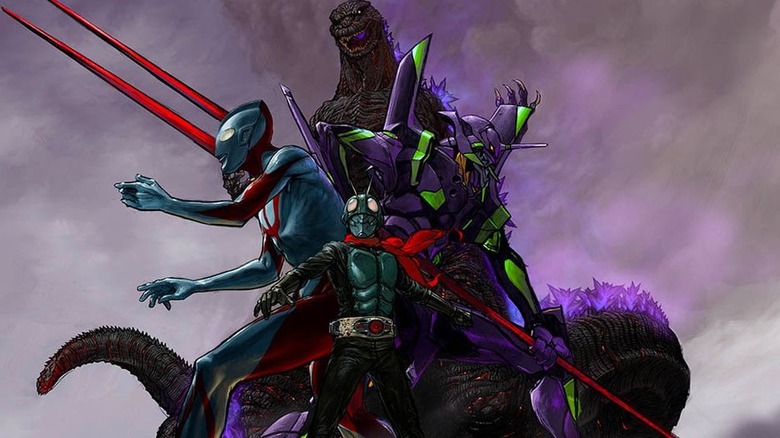The Untold Truth Of Neon Genesis Evangelion
Anime series come and go, but "Neon Genesis Evangelion" still manages to inspire as much passion, praise, and controversy today as it did when it reshaped the mecha genre forever in 1995. It's often brought up in discussions about the best anime of all time. Even its critics would agree it's one of the most important of all time. The "Rebuild of Evangelion" movie series, which could have been a cheap cash-in, somehow managed to further enrich one of anime's most complicated and fascinating franchises.
A lot has been written about "Evangelion," but sorting out the truth from urban legends and fan speculation can be difficult with a series as talked about as this. Further complicating matters is that claims from different creatives involved in the production of the anime often contradict each other. The full truth about "Neon Genesis Evangelion" may never be truly known, but, pulling from a variety of sources, here's what we can tell you about the history of this seminal series.
It singlehandedly saved Gainax
If "Neon Genesis Evangelion" had failed, Gainax would likely have left the anime industry entirely. In the late '80s and early '90s, the otaku-run studio had found some success with the OVAs "Gunbuster" and "Otaku no Video," but its first TV series, "Nadia: The Secret of Blue Water," had a troubled production. To make matters worse, the film "Uru in Blue" (a proposed sequel to "Royal Space Force: The Wings of Honnêamise") went nowhere. By 1993, Gainax was on the brink of either closing or switching its focus from anime to the more profitable realm of video games.
The fortunes of the studio would change dramatically after a phone call between Toshimichi Ootsuki, a representative of King Records, and Hideaki Anno, co-founder of Gainax. Anno directed "Gunbuster" and "Nadia" and was supposed to helm "Uru in Blue" as well, but he found himself looking for a new project when the film didn't pan out. According to Anno's official biography on the Khara website, Ootsuki called Anno and told him: "Bring me something, anything, and I'll make sure it gets green-lit." That's how "Neon Genesis Evangelion" got its start.
Making the show was a grueling experience for Anno, but the final product was worth all the hard work. The Gainax/King Records collaboration became an industry-changing hit. Gainax remained one of the top anime studios of the late '90s and 2000s, though its profile faded in the 2010s, with top creatives forming their own studios like Khara and TRIGGER.
Major changes to the original pitch
The original proposal for "Neon Genesis Evangelion" was released to the public via the "Neon Genesis Evangelion Newtype 100% Collection" art book in 1997. The anime famously diverged from its original pitch around halfway through when Hideaki Anno decided to incorporate his struggles with depression into the story, and it's fascinating to see the changes from the original 26-episode outline to what it eventually became.
Many of the changes in the second half have more to do with the order of events rather than the events themselves, but some episode proposals didn't make it into the series. Episodes 15 and 16 were originally going to involve Unit 01 being rebuilt and Shinji directly communicating with an Angel. Kaworu Nagisa originally had a cat following him everywhere, which, according to an interview with Anno, was scrapped for being too annoying to draw.
The ending is where the biggest differences take place: 12 additional Angels were going to come from the moon and blow up America, prompting conflict between NERV and the UN. Some of the characters' political motivations were changed to avoid comparisons with Aum Shinrikyo, the Japanese doomsday cult that carried out a deadly nerve agent attack on the Tokyo underground the same year that "Evangelion" was released.
It's technically a show for kids
"Neon Genesis Evangelion" is a violent, disturbing anime with significant sexual themes and potentially triggering dives into the depths of depression — and it's a show for kids! Seriously, "Neon Genesis Evangelion" originally aired in the same time slot as the likes of "Teenage Mutant Ninja Turtles" and "Looney Tunes" in Japan. While it was certainly popular with adults and would inspire a wave of late-night, adult-oriented anime, "Neon Genesis Evangelion" was sold as a kids' show, much to the confusion of many in the west. "I'm 31 and seeing 'Neon Genesis Evangelion' and 'The End of Evangelion' wrecked me for a few days," one fan said. "And some of the images are really graphic and unexpected."
One might think that the gore and sexual content on display in "The End of Evangelion" (the feature-length parallel ending to the show) might have led to the film franchise being recategorized as something for adults, but that's not the case. While the films are generally marketed at a slightly older age group, all of the "Rebuild of Evangelion" movies somehow received G ratings in Japan, and "Evangelion" has even done crossovers with explicitly kid-oriented anime like "Shinkalion Z."
Does the religious symbolism mean anything?
Right from the show's title, which translates in Latin to "First Book of the New Gospel," "Neon Genesis Evangelion" is filled with both Jewish and Christian symbolism. The enemies are Angels that make cross-shaped explosions; the blueprints for the Evangelions themselves come from the Dead Sea Scrolls; the backstory involves the midrash of Adam and Lilith, and that's just scratching the surface. But was all this symbolism meant to send any specific messages?
For the most part, the anime's crew has denied any intentionality to the symbolism. "There is no actual Christian meaning to the show, we just thought the visual symbols of Christianity look cool," assistant director Kazuya Tsurumaki said. "If we had known the show would get distributed in the U.S. and Europe we might have rethought that choice." At a 2003 talk at MIT, Gainax co-founder Toshio Okada confirmed that Hideaki Anno didn't read the Bible when formulating the show.
Even so, too many people have been able to read meaning into the show's religious symbolism — particularly in relation to Kabbalah — to dismiss it as pure nonsense. One convincing theory is that the thematic parallels are taken less from the religious sources themselves and more from the philosophy of Carl Jung.
What happened with the final two episodes?
The final two episodes of "Neon Genesis Evangelion" are among the most controversial in anime history, abandoning the sci-fi mystery plot in favor of having the characters monologue through their problems. The show ends with Shinji ultimately deciding to take a more positive outlook on life and everyone applauding him, saying "Congratulations." What exactly led to this unconventional conclusion is a story with many conflicting accounts.
At Anime Expo 1996, an unnamed Gainax employee told the magazine Protoculture Addicts that the ending was changed due to complaints about the show's increasing violence, but the same magazine also reported that Anno meant for the episodes to turn out the way they did. Character designer Yoshiyuki Sadamoto said in the book "Parano Evangelion" that, while Anno did always want to end the series in an experimental manner, the original script for Episode 25 was going to provide a clearer narrative connection between Episode 24 and the abstract finale.
According to Sadamoto, the first half of "The End of Evangelion" was based on this original Episode 25 script. However, at Fanime 2010, Gainax co-founder Hiroyuki Yamaga denied that there ever was an alternate script or any planned ending beyond what made it to TV. Yamaga also said the limited animation style of the final two episodes was due to a tight production schedule (something Toshio Okada also implied by saying Anno couldn't decide on an ending).
The dark truth about The End of Evangelion's final line
"The End of Evangelion" answers more questions than the series does, showing the external effects of the Human Instrumentality Project where the TV ending took place inside Shinji's head. Where they strongly diverge is in the final moments of Shinji's character arc. The TV show concludes with Shinji making a positive breakthrough, but the closest thing to a happy ending in the exceedingly depressing movie is Shinji stopping himself from choking Asuka, the only other human still alive. Asuka's final words are "Kimochi warui," which can translate to either "How disgusting" or "I feel sick."
It turns out this line was improvised by Asuka's voice actress, Yuko Miyamura. She revealed on the talk show Anime Yawa that the original final line in the script was "Anta nankani korosareru nowa mappira yo," which translates to "I'd never want to be killed by you of all men, absolutely not!" None of her readings of this line pleased Hideaki Anno. When he asked her how she would react in Asuka's situation, she said the words that made it into the film.
Recording these scenes was an incredibly stressful experience that went to some dark places. Megumi Ogata, who plays Shinji, said in an interview with Dany Johnson that she actually strangled Miyamura while recording the strangling scene. "I was so agitated that I strangled her too hard, making it impossible for her to say her lines for a while," Ogata revealed. "Of course, I apologized to her for doing that. I almost killed her."
Hideaki Anno's complicated relationship with Hayao Miyazaki
Is Gendo Ikari — Shinji's father and the commander of NERV — based on Studio Ghibli co-founder Hayao Miyazaki? It's an idea that's been speculated on, but pinning down the precise nature of Anno's feelings about his legendary mentor is complicated. The two anime directors don't seem like they would get along, with Anno being a vocal otaku and Miyazaki vocally hating otaku. Yet, they've worked together on-and-off since Miyazaki's 1984 film "Nausicaa of the Valley of the Wind," in which Anno animated the horrifying God Warrior (pictured above), a clear precursor to the Angels in "Evangelion."
In the documentary "Hideaki Anno: The Final Challenge of Evangelion," Miyazaki said his first impression of Anno was that he seemed like an "alien." Anno called Miyazaki a tough boss and a "mean old guy" in his "Nausicaa" audio commentary (via SoraNews24). Yet, the two continue to have a long-lasting friendship with productive collaborations. Anno voiced Jiro Horikoshi in Miyazaki's 2013 film "The Wind Rises," and Miyazaki's Studio Ghibli provided old-school cel animation supplies for a scene in 2021's "Evangelion: 3.0+1.01 Thrice Upon a Time."
Weta Workshop's failed live-action remake
After Peter Jackson's "The Lord of the Rings" trilogy, it seemed as if Weta Workshop's special effects prowess could bring any seemingly "unfilmable" epic to life. In 2003, it was announced that the studio would be bringing "Neon Genesis Evangelion" into live-action, with Gainax and ADV Films co-producing. Impressive concept art whetted fans' appetites, though plans to change characters' names and ethnicities inspired concern. Weta's Ben Wootten and Richard Taylor gave a 21 minute interview about the adaptation as a bonus feature on the "Neon Genesis Evangelion" Director's Cut DVD release, revealing that they were thrilled to be working on such an iconic property.
Hideaki Anno was reportedly interested in having Daniel Radcliffe play Shinji, while his "Harry Potter" co-star Emma Watson was apparently being eyed for Asuka. However, according to Tiffany Grant, the first English voice of Asuka and former wife of ADV exec Matt Greenfield, there was no official casting or even a shooting script written. "No one was ever approved or anything," she said (via Polygon). "The whole process went on for years and years." Anno's split from Gainax to form Khara and the subsequent legal battles between Gainax and ADV effectively killed the chances of this adaptation ever leaving development hell.
Missing ending themes
The release of "Neon Genesis Evangelion" on Netflix was met with a few different controversies from long-time fans. There were arguably unfair complaints about Netflix producing a whole new dub with a different voice cast, as well as fairer complaints about awkward and sometimes meaning-changing translations. One source of almost universal disappointment, however, was that Netflix was unable to license the original ending themes outside Japan.
Originally, each episode of "Evangelion" ended with a different cover of Bart Howard's jazz standard "Fly Me to the Moon." All these covers were gone from Netflix outside of Japan. Reports suggest that it was just too expensive to license all the different covers for a show that already must have cost a lot to license, but it's still disappointing to lose one of the series' distinctive eccentricities, especially since "Fly Me to the Moon" has been licensed for other Netflix releases like "Squid Game." Even GKIDS' special edition Blu-Ray release, which was able to include both the Netflix and ADV dubs and subtitle tracks, couldn't license the original ending themes.
Non-binary readings of Shinji
Canonically, Shinji Ikari is a cisgender male, but trans and non-binary interpretations of his story have become increasingly common. Shinji struggles to live up to others' expectations of masculinity. He has an androgynous appearance (Yoshiyuki Sadamoto has joked that Shinji's character design is basically just Nadia with a haircut), he is occasionally shown wearing feminine clothes, and he questions his sexuality after meeting Kaworu. Many trans and non-binary viewers have related to Shinji's struggles.
Shinji has also been voiced by two non-binary actors. Casey Mongillo was already out as non-binary when they were cast in the Netflix English dub, which spurred a massive increase in discourse surrounding "Evangelion" and gender. More recently, upon accepting the Best Voice Actress award at the 2022 Seiyu Awards, Shinji's original Japanese voice actor Megumi Ogata said: "70% of the roles I've done are boys and I don't really consider myself an actress. There is so much talk about being genderless nowadays and there are voice actors in the industry who have come out [as queer]. And like myself, there are people out there who go on about their daily lives mostly not thinking of themselves as women."
The weirdest Evangelion merchandise
The YouTuber Red Bard has theorized that it might be possible to live entirely on "Evangelion" merchandise. The sheer number of officially licensed "Evangelion" items discussed in their video is somewhat mind-boggling: You might expect there to be tons of "Evangelion" clothes and toys, but "Evangelion" construction tools, electric cars, and engagement rings? If you can name an item, there's probably been an "Evangelion" version of it at some point.
The way the "Evangelion" licensing plays out in combination with the oft-disturbing content of the show itself can lead to some truly weird merchandise. "Evangelion" water bottles are one thing, but making bottles in the shape of the pilots' suits as if you're drinking their bodies after they've dissolved into LCL is just creepy. Gainax did at least have the sense to keep the Lilith plate to just a promotional stunt as opposed to a mass-produced item. And even years later, the Schick x Evangelion razor ads, with Gendo suddenly finding happiness after shaving, remain both hilarious and uncanny.
A shared universe with Godzilla, Ultraman, and Kamen Rider
Hideaki Anno might be finished making "Evangelion" anime following the satisfying conclusion of "Evangelion: 3.0 + 1.01 Thrice Upon a Time," but he's certainly not done milking the cash cow. The "Shin Japan Heroes Universe" opens up even more exciting avenues for merchandising, crossing over "Evangelion" with three other classic Japanese sci-fi properties that Anno either has or will work with: "Godzilla," "Ultraman," and "Kamen Rider." Anno co-directed 2016's critically acclaimed "Shin Godzilla" film and wrote the script for the 2022 "Shin Ultraman" film. His "Shin Kamen Rider" film is scheduled to be released in 2023.
In all likelihood, this probably won't be a "cinematic universe" in the vein of the Marvel or DC universes. All four of these properties are owned by different studios, and there's nothing in any of Anno's films with these characters thus far to imply a shared universe. As promotional stunts go, however, it's a fun one with lots of potential for merchandise, theme parks, events, and maybe even a non-canonical movie or anime at some point.
